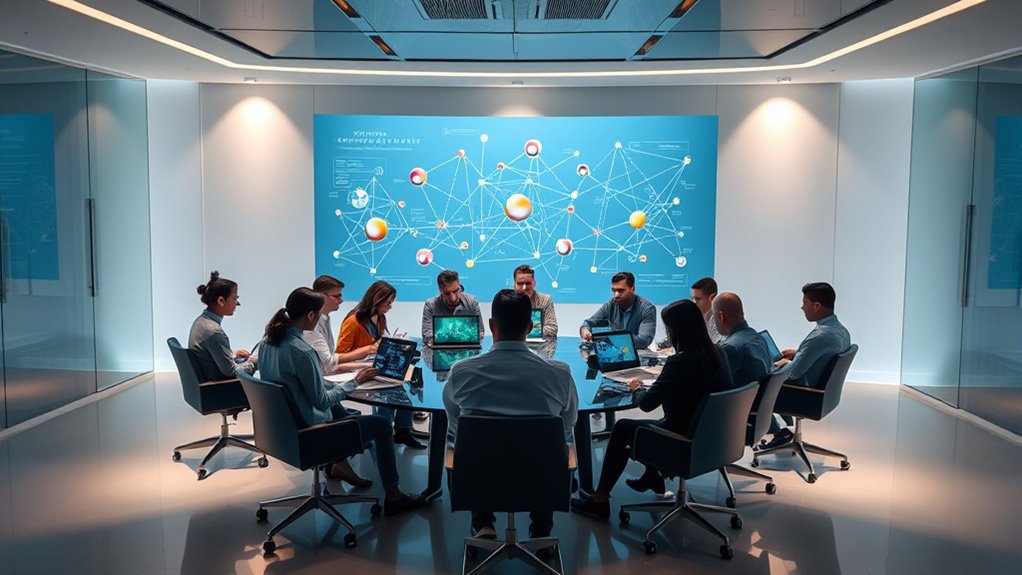In DAO governance, you participate directly in decision-making through token voting. You can submit proposals, discuss options, and cast votes based on how many tokens you hold, which influence outcomes. The process is transparent, recorded on the blockchain, and often includes mechanics like quorum and delegation. This system promotes decentralization and broad involvement. If you want to understand how these decisions come together and the rules behind them, there’s more to explore.
Key Takeaways
- Members hold governance tokens to gain voting rights and influence proposals and organizational decisions.
- Proposals are submitted, discussed, and voted on, with results recorded transparently on the blockchain.
- Voting rules include quorum requirements, token-weighted influence, and mechanisms to prevent malicious activity.
- Delegation allows members to appoint trusted representatives to vote on their behalf.
- Approved proposals are automatically or manually implemented, promoting transparent and decentralized decision-making.

Decentralized Autonomous Organizations (DAOs) are reshaping how communities and stakeholders make decisions by leveraging blockchain technology. Instead of relying on traditional leadership structures, DAOs empower members to participate directly in governance through mechanisms like token voting. When you hold governance tokens, you’re granted a say in the organization’s future, giving you the ability to influence proposals, budgets, and strategic directions. This setup creates a more democratic process where power is distributed among members, rather than concentrated in a few individuals.
Token voting is at the core of DAO governance. As a token holder, you can cast your vote on various proposals that impact the organization’s operations. These proposals might involve allocating funds, changing protocol rules, or launching new features. The more governance tokens you possess, the greater your voting power. This system incentivizes active participation because your influence correlates directly with your token holdings. It’s essential to understand that governance tokens are not just digital assets; they’re the keys to collective decision-making. They embody your stake in the organization and your right to shape its trajectory.
The process of token voting usually involves submitting a proposal, which is then discussed among community members. Once a proposal gains enough support or meets specific voting thresholds, it can be enacted automatically or require further approval. This process fosters transparency, as all votes and discussions are recorded on the blockchain, allowing anyone to verify the process. Additionally, many DAOs implement mechanisms like quorum requirements or weighted voting to ensure decisions reflect the majority’s will while preventing manipulation.
You should know that governance tokens often come with specific rules for voting, such as lock-up periods or minimum holdings. These rules help prevent spam or malicious attempts to sway decisions unfairly. Also, some DAOs incorporate delegation features, enabling you to entrust your voting power to a trusted representative if you’re unable to participate directly. This flexibility encourages broader engagement and helps maintain an active, informed community.
Frequently Asked Questions
How Are Voting Weights Determined in DAO Governance?
Your voting weights in DAO governance are determined by your token distribution, which directly affects your voting power. The more tokens you hold, the greater your influence on proposals and decisions. This system guarantees that voting power aligns with your stake in the organization, encouraging active participation and responsible decision-making. So, your token holdings are the key factor shaping your influence within the DAO.
What Are the Common Types of Proposals in DAOS?
You’ll find that proposals in DAOs generally fall into common categories like governance changes, funding requests, and operational updates. These proposal categories help organize decision types, making it easier for members to submit and review ideas. Whether it’s adjusting rules, allocating resources, or updating project plans, understanding these typical proposal types helps you participate effectively and navigate the decision-making process within your decentralized organization.
How Do DAOS Handle Conflicts of Interest Among Members?
In DAOs, you handle conflicts of interest through conflict resolution strategies like transparent voting and bias mitigation measures such as quorum requirements. You’re encouraged to disclose any personal interests related to proposals, ensuring decisions remain fair. By fostering open discussion and implementing safeguards, DAOs minimize bias, promote accountability, and maintain trust among members, helping everyone work towards common goals despite potential conflicts.
Can Members Lose Voting Rights in a DAO?
Yes, members can lose voting rights in a DAO through member removal processes. If a member breaches the rules or acts against the organization’s interests, the community can vote to revoke their voting rights. This guarantees governance remains fair and trustworthy. Keep in mind, such actions typically follow established procedures, so members are aware of the potential for voting rights to be revoked if they violate DAO policies.
How Are Disputes Resolved Within DAO Governance Frameworks?
Dispute resolution in DAO governance combines transparency with community-led conflict management. When disagreements arise, members often turn to voting mechanisms, dispute resolution protocols, or specialized arbitration processes designed for decentralized environments. You’re encouraged to participate actively, proposing solutions or mediating conflicts. This process fosters accountability and trust, ensuring that conflicts are managed fairly while preserving the decentralized ethos of the organization.
Conclusion
Understanding DAO governance shows how decentralized organizations make decisions without central authority. Did you know that over $13 billion worth of assets are managed through DAOs globally? This highlights the rapid growth and trust in decentralized decision-making. As you get involved, remember that transparency and community participation are key. Embracing these principles can help shape a fairer, more democratic future for organizations everywhere. Immerse yourself and contribute—you’re part of this revolutionary shift!








